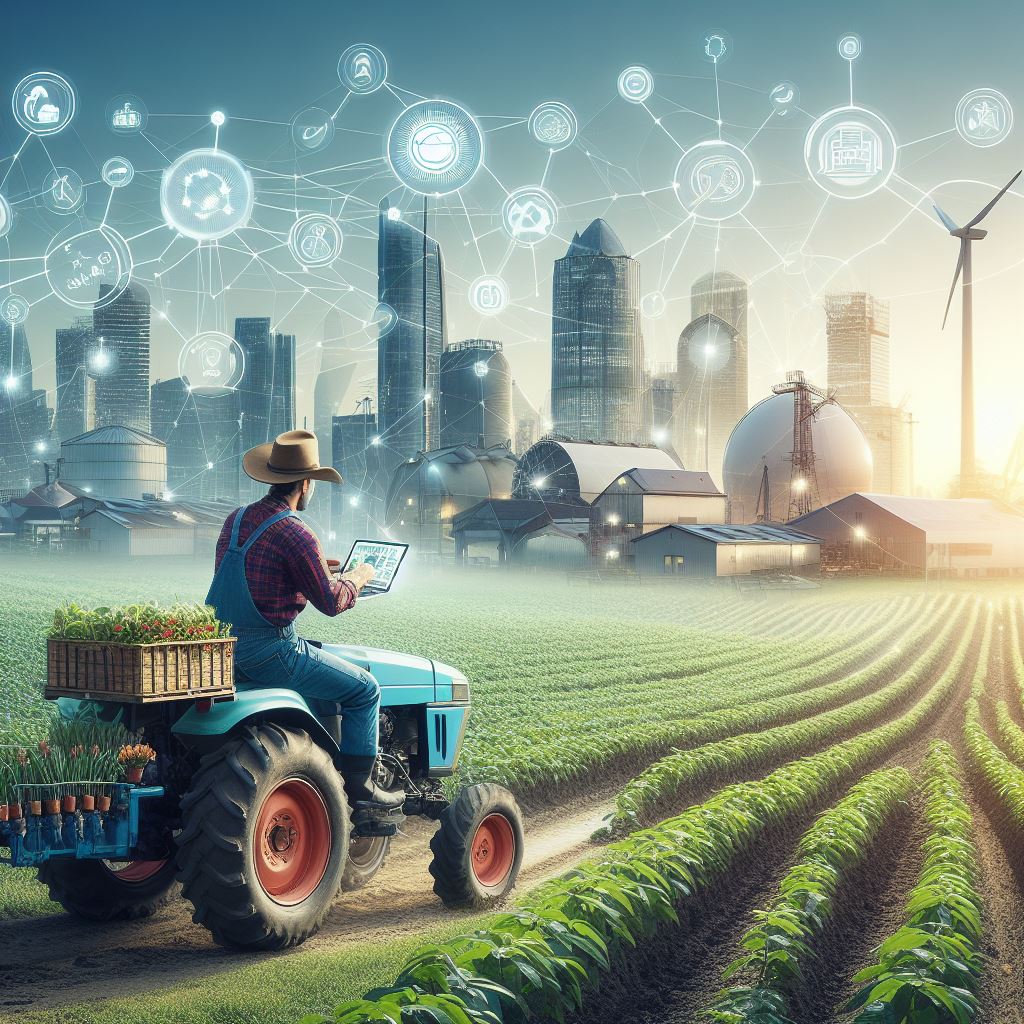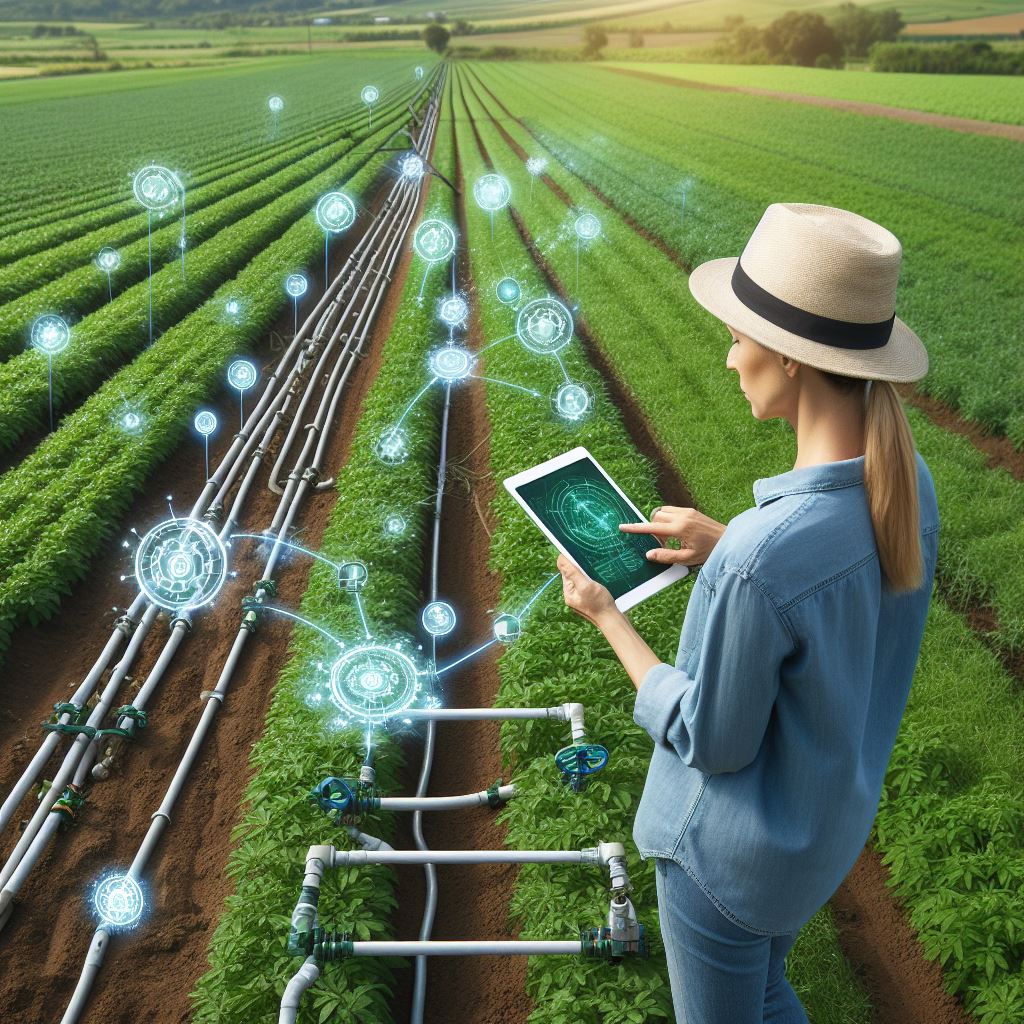Introduction
Agriculture has always been at the core of human civilization, providing sustenance and livelihood for communities.
In the modern era, technology has become an essential tool in transforming and optimizing the agricultural industry.
Technology plays a pivotal role in modern agriculture, revolutionizing traditional farming methods and enhancing productivity.
Precision farming techniques, enabled by technologies like GPS, sensors, and drones, optimize resource usage, reducing waste and environmental impact.
Automated machinery and robotics streamline labor-intensive tasks, increasing efficiency and lowering costs.
Data analytics and machine learning provide valuable insights for crop management, predicting disease outbreaks, and optimizing yields.
Furthermore, connectivity facilitates real-time monitoring and control, empowering farmers to make informed decisions.
Overall, the integration of technology in agriculture not only boosts productivity but also promotes sustainability and helps meet the growing global demand for food in an efficient and environmentally responsible manner.
Agri-tech startups, also known as agricultural technology startups, are entrepreneurial ventures that leverage technology to address challenges and improve efficiency in farming practices.
These startups are bridging the gap between traditional farming methods and the potential of cutting-edge technology.
The role of technology in agriculture
Technology has revolutionized the agricultural industry, bringing numerous benefits and opportunities for agri-tech startups.
Increase in productivity and efficiency
- Advanced machinery and equipment allow farmers to complete tasks more quickly and efficiently.
- Automation and robotics reduce the need for manual labor, saving time and resources.
- Precision farming techniques, such as GPS and sensors, enable farmers to optimize inputs and minimize wastage.
- Data analytics and predictive modeling help in making informed decisions, maximizing yield and minimizing losses.
- Real-time monitoring and remote sensing enable early detection and prevention of diseases and pests.
Overall, technology empowers farmers to produce more with fewer resources, leading to increased productivity and profitability.
Improving sustainability and environmental impact
- Precise application of inputs ensures minimal wastage and reduces the environmental footprint of agriculture.
- Smart irrigation systems and weather monitoring tools help conserve water and prevent overuse.
- Efficient use of fertilizers and pesticides prevents pollution and minimizes the impact on ecosystems.
- Sustainable practices, such as organic farming and regenerative agriculture, gain support through technological advancements.
- Integration of renewable energy sources, like solar panels and wind turbines, helps in reducing carbon emissions.
By promoting sustainable practices, technology enables farmers to protect the environment and preserve natural resources for future generations.
Enhancing crop quality and yield
- Precision planting and seeding techniques result in consistent crop spacing and uniform growth.
- Monitoring tools track crop health, allowing for early intervention and disease prevention.
- Genetic engineering and breeding technologies develop high-yielding and pest-resistant crop varieties.
- Indoor farming technologies, like hydroponics and vertical farming, optimize resource utilization and year-round production.
- Post-harvest technologies, such as cold storage and packaging innovations, maintain crop quality and extend shelf life.
By leveraging technology, farmers can produce higher-quality crops, meet market demands, and achieve better yields.
Streamlining farm operations
- Farm management software and mobile applications enable efficient planning, record-keeping, and decision-making.
- Supply chain management systems ensure smooth coordination between farmers, distributors, and retailers.
- Drones and satellite imaging speed up field surveys, mapping, and monitoring of large agricultural areas.
- Smart sensors and IoT devices provide real-time data on soil moisture, temperature, and other crucial parameters.
- Robotics and automation streamline tasks like harvesting, sorting, and packaging, reducing manual labor requirements.
By streamlining operations, technology simplifies the management of farms, improves resource allocation, and reduces costs.
Transform Your Agribusiness
Unlock your farm's potential with expert advice tailored to your needs. Get actionable steps that drive real results.
Get StartedIn essence, technology plays a crucial role in transforming agriculture by increasing productivity, improving sustainability, enhancing crop quality, and streamlining farm operations.
Agri-tech startups have the opportunity to bridge the gap between technology and farming, ushering in a new era of innovation and growth in the agricultural industry.
Challenges faced by the agriculture industry
Limited access to capital and resources
The agriculture industry faces several challenges as it strives to bridge the gap between technology and farming.
Limited access to capital and resources is a major obstacle faced by farmers.
Without sufficient funding, they find it challenging to implement modern technologies, hindering their ability to improve productivity and efficiency.
Fragmented market and lack of standardized solutions
Moreover, the highly fragmented nature of the agriculture market contributes to the lack of standardized solutions.
With numerous small-scale farmers operating independently, it becomes difficult for agri-tech startups to develop products that cater to the specific needs of every farmer.
Standardization is vital to ensure wider adoption and the efficient use of technology.
Resistance to change and adoption of new technologies
Resistance to change and the adoption of new technologies is another significant challenge.
Farmers have a long-standing reliance on traditional farming methods, often driven by skepticism and fear of the unknown.
Overcoming this resistance requires effective education and awareness campaigns, highlighting the benefits of technological advancements and addressing concerns.
Disconnect between farmers and technology developers
Additionally, there is a disconnect between farmers and technology developers.
Farmers may struggle to comprehend the complexities of technological solutions, leading to a lack of trust and confidence in implementing them.
Bridging this gap requires active engagement between farmers and developers, ensuring that solutions are practical and user-friendly.
To overcome these challenges, collaborative efforts are necessary. Governments, agricultural organizations, and investors must work together to provide farmers with increased access to capital and resources.
This will enable them to invest in technological advancements that can revolutionize the agriculture industry.
At the same time, agri-tech startups should focus on building standardized solutions tailored to the diverse needs of farmers.
They should actively involve farmers in the development process, seeking their feedback and insights to create user-friendly and efficient technologies.
Educational initiatives and awareness programs are crucial in facilitating the adoption of new technologies.
Farmers need to understand the benefits and value that these innovations can bring to their businesses, addressing their concerns to encourage widespread adoption.
In essence, while the agriculture industry faces various challenges in bridging the gap between technology and farming, collaborative efforts and a proactive approach can overcome these obstacles.
By addressing limited access to capital, standardizing solutions, promoting technology adoption, and establishing effective farmer-developer communication, the industry can harness the full potential of agri-tech and drive sustainable development in farming practices.
Read: Automation: Changing Agriculture
Agri-tech startups as solution providers
Definition and characteristics of agri-tech startups
Definition:
Agri-tech startups are companies that merge agricultural practices with the latest technology to solve farming challenges.
Showcase Your Farming Business
Publish your professional farming services profile on our blog for a one-time fee of $200 and reach a dedicated audience of farmers and agribusiness owners.
Publish Your ProfileCharacteristics:
- Innovative: Agri-tech startups actively seek original, technology-driven solutions for agricultural problems.
- Scalable: These startups have the potential to grow rapidly and have a wide-reaching impact.
- Collaborative: They often collaborate with farmers, researchers, and experts in the agricultural industry.
- Impact-focused: Agri-tech startups aim to have a positive impact on the efficiency, sustainability, and profitability of farming.
Examples of successful agri-tech startups and their impact
- Farmer’s Fridge: Utilizes vending machines with fresh, locally sourced salads and snacks, reducing food waste.
- Indigo Agriculture: Develops microbial technology to improve crop yield and reduce the use of synthetic fertilizers.
- Taranis: Utilizes aerial imaging and machine learning to identify and address crop diseases and pests more effectively.
- Bowery Farming: Implements vertical farming techniques to produce high-quality, pesticide-free greens using less water and space.
- Pivot Bio:Produces nitrogen-fixing microbes that reduce the need for synthetic nitrogen fertilizers, lowering costs and environmental impact.
Innovations brought by agri-tech startups
1. Precision agriculture and remote sensing
Agri-tech startups use satellite imagery and drones to monitor crops, optimize irrigation, and detect plant stress.
2. Internet of Things (IoT) and sensor technologies
Startups integrate sensors, weather stations, and IoT devices to collect real-time data, enhancing yield predictions and resource management.
3. Data analytics and predictive modeling
By analyzing vast amounts of data, startups can provide insights on optimal planting times, crop diseases, and market trends.
4. Robotics and automation
Agri-tech startups develop autonomous robots for various tasks, from harvesting to precision spraying, reducing labor costs and increasing efficiency.
5. Biotechnology and genetic engineering
Startups use biotech methods to enhance crop resistance, improve nutritional content, and develop drought-tolerant varieties, benefiting farmers and consumers.
Agri-tech startups have revolutionized the farming industry, bridging the gap between technology and agriculture.
These innovative companies bring a range of solutions to farming challenges, improving sustainability, efficiency, and profitability.
Through precision agriculture, remote sensing, IoT, and sensor technologies, they optimize resource usage and reduce environmental impact.
Data analytics and predictive modeling help farmers make informed decisions, while robotics and automation streamline labor-intensive processes.
Additionally, biotechnology and genetic engineering advancements yield crops with increased nutritional value and resilience.
Successful startups like Farmer’s Fridge, Indigo Agriculture, and Taranis have already made a significant impact in the agricultural sector.
Their collaborations with farmers and utilization of cutting-edge technology have transformed the way farming is done.
With the continued growth of agri-tech startups, we can expect further advancements that will shape the future of agriculture.
Read: Predictive Analytics in Agriculture

Delve into the Subject: Precision Agri: A New Era of Farming
Benefits of agri-tech startups in bridging the gap
Addressing the challenges faced by the agriculture industry
- Increasing productivity through the use of advanced technologies and automation.
- Improving the efficiency of farming operations with real-time data collection and analysis.
- Enhancing crop and livestock management through precision agriculture techniques.
- Reducing the dependence on manual labor and minimizing human errors in farming practices.
- Managing and mitigating risks such as pests, diseases, and climate change impacts.
Providing customized and cost-effective solutions
- Developing tailored software and applications to meet the specific needs of farmers.
- Offering affordable hardware devices and sensors for data collection and monitoring.
- Implementing data-driven decision-making processes to optimize resource allocation.
- Reducing input costs by optimizing resource utilization and minimizing wastage.
- Enabling small-scale farmers to access advanced technologies that were previously out of reach.
Enabling knowledge sharing and collaboration
- Creating platforms for farmers to share their experiences and best practices.
- Facilitating collaboration between farmers, researchers, and agricultural experts.
- Promoting the exchange of information and ideas on innovative farming techniques.
- Strengthening farmer networks and encouraging collective learning and problem-solving.
- Expanding access to agricultural knowledge and expertise through digital platforms.
Creating opportunities for rural development and job creation
- Generating employment opportunities in the agri-tech sector, particularly in rural areas.
- Providing training and skill development programs to empower local farmers and workers.
- Driving economic growth in rural communities through increased agricultural productivity.
- Encouraging entrepreneurship and innovation in the agriculture and technology sectors.
- Attracting investment in rural areas by showcasing the potential of agri-tech solutions.
In fact, agri-tech startups play a crucial role in bridging the gap between technology and farming.
By addressing the challenges faced by the agriculture industry, providing customized and cost-effective solutions, enabling knowledge sharing and collaboration, and creating opportunities for rural development and job creation, these startups contribute to the sustainable growth and modernization of agriculture.
Through their innovative approaches, agri-tech startups have the potential to revolutionize the way farming is done, making it more efficient, productive, and environmentally sustainable.
Read: AI in Farming: Boosting Yields Smartly
Collaboration between farmers and technology developers
Importance of farmer input and feedback in technology development
Collaboration between farmers and technology developers is crucial for the advancement of agri-tech startups.
Farmers bring valuable insights and expertise from their on-field experiences.
Their input and feedback can help technology developers create solutions that are practical and address real farming challenges.
This collaboration ensures that agri-tech products and services are tailored to meet the specific needs of farmers.
By involving farmers in the development process, technology developers can also build a sense of ownership among farmers.
Their involvement increases the chances of successful adoption and implementation of new technologies on the farm.
Building trust and understanding between farmers and startups
To foster collaboration, it is essential to establish trust and understanding between farmers and startups.
Startups should actively engage with farmers by conducting field visits and seeking their opinions.
This hands-on approach allows startups to gain insights into the farming practices, challenges, and requirements.
By demonstrating a genuine effort to understand farmers’ needs, startups can build credibility and trust.
Transparency in communication and sharing of information also helps in fostering trust.
Startups should clearly explain the purpose and benefits of their technology to farmers to minimize skepticism.
Promoting partnerships and collaboration through incubators and accelerators
Incubators and accelerators play a vital role in promoting partnerships and collaboration between farmers and startups.
These platforms provide a structured environment for startups to interact with farmers, experts, and investors.
They offer mentorship, networking opportunities, and resources to nurture the growth of agri-tech startups.
Through these programs, startups can gain access to the agricultural knowledge pool and receive feedback directly from farmers.
Collaboration in such environments encourages innovation and helps in refining technologies to suit farmer requirements.
Case studies of successful collaborations between farmers and startups
Several successful collaborations between farmers and startups serve as inspiring examples for the potential of collaboration in agri-tech.
One such example is the partnership between a startup and a group of farmers to develop a soil testing tool.
By involving farmers from the early stages, the startup developed a user-friendly solution that accurately analyzes soil quality.
Another case study involves a partnership between a precision agriculture startup and a group of farmers.
Showcase Your Farming Business
Publish your professional farming services profile on our blog for a one-time fee of $200 and reach a dedicated audience of farmers and agribusiness owners.
Publish Your ProfileThe startup developed a drone-based imaging system that helps farmers detect crop diseases early and take timely action.
In both cases, the collaboration between farmers and startups led to the creation of practical and effective agri-tech solutions.
In general, collaboration between farmers and technology developers is crucial for the success of agri-tech startups.
Farmer input and feedback are invaluable in technology development, building trust, and understanding.
Platforms like incubators and accelerators facilitate partnerships and collaboration, leading to innovative solutions.
The case studies of successful collaborations highlight the power of farmer-startup partnerships in advancing agriculture technology.
Read: Machine Learning: A Farmer’s Ally
Conclusion
Agri-tech startups play a vital role in bridging the gap between technology and farming by introducing innovative solutions to address challenges in agriculture.
Leveraging advancements such as IoT, AI, and data analytics, these startups enhance precision farming, optimizing resource utilization and crop management.
They provide farmers with real-time data on weather, soil health, and crop conditions, enabling informed decision-making.
Additionally, agri-tech startups often facilitate access to markets, financial services, and supply chain management, empowering farmers economically.
By integrating technology into traditional farming practices, these startups contribute to increased productivity, sustainability, and resilience in the agricultural sector, fostering a more efficient and modernized farming landscape.
It is important to continue supporting and encouraging innovation in the agri-tech sector to drive progress in agriculture.
Continued innovation and support for agri-tech startups are crucial for addressing global food security challenges.
These startups leverage technology to enhance agricultural efficiency, improve crop yields, and minimize environmental impact. Innovation in precision farming, IoT, and data analytics enables farmers to make informed decisions, optimize resource use, and adapt to changing climatic conditions.
Agri-tech startups also contribute to sustainable practices, reducing waste and fostering resilience in the face of evolving agricultural needs.
Supporting these initiatives fosters economic growth, creates jobs, and ensures a more resilient and productive agriculture sector, ultimately benefiting both farmers and consumers worldwide.
Farmers should be encouraged to embrace and adopt new technologies to ensure a sustainable and efficient agriculture industry.




